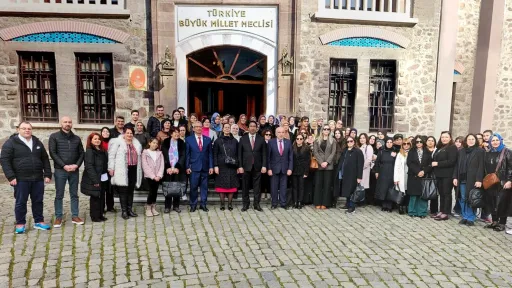The Contemporary Islamic Thought in Asia and the Balkans Discussed at the "Contemporary Thought in the Muslim World Conference"

The conference, attended by numerous Muslim scholars from different countries, featured presentations on the contemporary Islamic thought in Asia and the Balkans.
Burak Çalışkan from York University presented on the Contemporary Islamic thought in Asia and the Balkans during the last two sessions of the conference. He discussed the Islamic thought in Uzbekistan, covering the "golden age," the Russian period, and the era of independence. Çalışkan highlighted the historical role of medreses in centers like Buhara and Samarkand in producing numerous Islamic scholars and scientists. He emphasized that the cultural and intellectual life was negatively affected by the Russian occupation.
Çalışkan pointed out that religious ideas, previously prohibited during the independence and Soviet periods, have been re-examined in contemporary times. He mentioned that in this process, the Sufi tradition has been presented as part of the Uzbek tradition. According to Çalışkan, Salafism became more influential in Uzbekistan after gaining independence, and there were struggles by Salafis to establish their dominance in certain regions.
Since 1998, Çalışkan noted an increase in Islamic opposition in Uzbekistan and mentioned the government's efforts to establish an official understanding of Islam.
Responsibility of Scholars Towards People
Khairudin Aljunied from the National University of Singapore addressed "Muslim Intellectualism" in Southeast Asia. He emphasized that, according to Islam, scholars are responsible for the people. Aljunied highlighted the interdisciplinary nature of Islamic education, providing a broad vision unlike modern education. He expressed that the current age faces various problems, including internet and social media addiction. Aljunied stated that, after liberalism, the world is experiencing a new division, and the increasing wealth of the rich does not benefit the people. He also mentioned the division among the 2 billion Muslims worldwide based on color, race, and class, making it challenging to address issues like Palestine.
Aljunied concluded by stating, "When understanding the history of the ummah, we should consider not just one region but the entire history. We are all connected. The majority of the Muslim world lives in Asia, but their ideas are not discussed and understood enough. Perceiving Muslims as if they only live in the Middle East also necessitates a reform in the ummah."
"Islam is the Only Possible Thought for Societies in the Islamic Geography"
Prof. Dr. Admir Mulaosmanovic from the International University of Sarajevo expressed his thoughts on the change in the Muslim worldview. He said, "Islam is the only possible thought for societies in the Islamic geography." Mulaosmanovic pointed out that recent global changes have negatively impacted traditional Islamic institutions and thinking, and processes like colonialism led Muslim intellectuals to criticize Islamic belief.
Highlighting the need for Muslim thought to be based on ethics as an alternative paradigm, Mulaosmanovic stated, "After the era of a unipolar world, the construction of a multipolar world has begun, and Muslims have the opportunity to become a global political subject. The first step to achieve this is to overcome the lack of trust in the intellectual field."
Dr. Hazim Fazlic from Lake Forest College discussed the debates among Muslim intellectuals in Bosnia and Herzegovina. He mentioned that Muslim thinkers began contemplating how to live as Muslims following the collapse of communism. They started pondering on new interpretations of Islam, as well as how to live in a secular state amidst war and genocide.
About the Conference
The "Contemporary Thought in the Muslim World Conference" aims to address contemporary issues affecting Muslim communities worldwide and deepen the understanding of contemporary Muslim thought. The conference examined the "Contemporary Thought in the Muslim World Project," consisting of an 11-volume book series led by the Presidency for Turks Abroad and Related Communities (YTB). The project, initiated in 2020, explores the contemporary experiences of Muslim communities in Turkey, Egypt, Iran, the Indian subcontinent, North Africa, Southeast Asia, the Balkans, and the West (Europe/USA), as well as in the Turkish world, the Arab world, and sub-Saharan Africa.
During the conference, Muslim academics gathered and, in a press conference, condemned human rights violations in the Gaza Strip by Israel, calling for urgent action. The conference, held at the Turkey Diyanet Foundation's Center for Islamic Studies (ISAM), featured speakers such as Abdullah Eren (President of YTB), Prof. Dr. Lütfi Sunar (Chairman of the Board of Directors of İlke Foundation), Prof. Dr. Syed Farid Alatas, Prof. Dr. Sari Hanafi, Prof. Dr. Salman Sayyid, Assoc. Prof. Dr. Yusuf Ziya Gökçek, and Dr. Serhat Orakçı.







